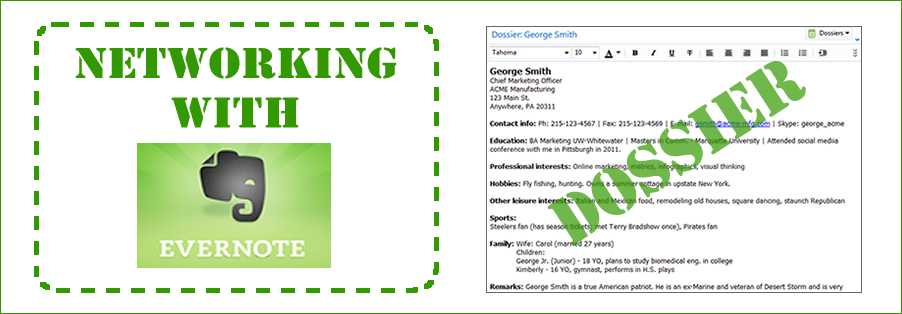One powerful way to keep your network relationships strong is to look for ways to pay value to these key people on a regular basis. A simple way to do that is to set up dossiers for them in Evernote.
A dossier is simply a file that contains everything you know about that person. It starts with their vitally important contact information, of course, but it goes much farther than that. It includes as many aspects of their personal and professional lives, which you gather from their LinkedIn and Facebook profiles, discussions with them, their published work online and so forth.
Your intent, of course, isn’t to stalk them, but to create a detailed profile of their background and interests. This is information that you’re seeing and hearing anyway – Evernote just gives you a way to capture it, instead of quickly forgetting it. This “personal CRM” system will enable you to pay value to them when you see a resource, person or business opportunity that would be of interest to them – or simply to be able to ask them what’s new with their significant other or children, and actually be able to remember their names. This can pay huge dividends by enabling you to build stronger relationships with them.
What should you include in a dossier?
You can easily set up notes in Evernote to act as dossiers for each of the key people whom you want to influence. What can you store in these notes? Here are a few ideas:
- Detailed contact information, including all of their social media points of presence
- Education
- Topics they’re interested in
- Hobbies
- Sports
- Family
- Remarks (notes on what else is unique or remarkable about them)
- What questions would you like to ask them about their expertise or experience or life lessons learned?
- How could they potentially help you?
- Qualities that you admire about them
All of this information so far is text-based. But because Evernote enables you to store many different types of information, you can take the idea of a dossier much farther, including items such as:
- Their picture
- Links to their points of presence online
- A copy of their resume (saved as an attachment)
- Links to key articles or white papers they have written
If you plan to store a large amount of information about your contacts, you may want to create a folder for each person, in which you can store multiple notes about them.
How can you use this information?
As you come across information and opportunities that you think would be relevant to one or more of them, you can simply do a search of your dossiers folder and identify the people who would be interested in it. Here are a few examples of this approach in action:
Scenario #1: You’ve just scored a pair of tickets and pit passes to an auto race that is coming to your city a month from now. So you search your dossiers and quickly locate a colleague who is nuts about racing. You “gift” the tickets to him and score some major relationship capital with him.
Scenario #2: While perusing your daily news feeds, you come across an interesting article on business models. You search your dossiers file and locate three people who are keenly interested in innovation and business strategy, and you e-mail a link to the article to each of them with personalized “I thought you’d be interested in this” messages.
Scenario #3: At a local networking event, you learn that the founder of a start-up company desperately needs a killer business strategist to help him prepare a business plan. Because he has a pitch coming up in 3 weeks at an event for venture capitalists, he really needs help – NOW! You search your database and find one person who can help with this urgent need. You e-mail him the information, and he’s thrilled! Connecting people you know with each other is a powerful use of dossiers.
But isn’t this a lot of work?
It can be, but it doesn’t have to be. I’m not suggesting that you store information about everyone you know in these Evernote dossiers – just key clients, customers and people in your profession and industry – the people you’d like to get to know better as part of your professional networking efforts. Limiting the number of people you track will help to keep this database manageable.
One of the things that makes this a little easier is that you can access Evernote wherever you are, on any computing platform. You just need to get into the discipline of adding each key nugget of information about these people as you learn more about them. Over time, this tool will enable you to serve them better and build stronger relationships with them!
Here’s the bottom line: How much are your relationships with your key contacts worth to you? If you realize that many of your future opportunities will come from your personal network, you’ll understand the value of making sure those relationships are strong and vital. And a simple collection of dossiers can help make that happen.


Brilliant yet simple, I love this approach. Really the end-value is giving value to your contacts. I'd love to see this type of build-out automated somewhat though, do you know of any apps that can do this on a large scale?
Evernote has a companion product called Hello that is supposed to do this (http://evernote.com/hello/). I still prefer more of a free-form approach. I think it gives me more flexibility. I'm going to start exploring Evernote Hello and will report my findings on this blog!